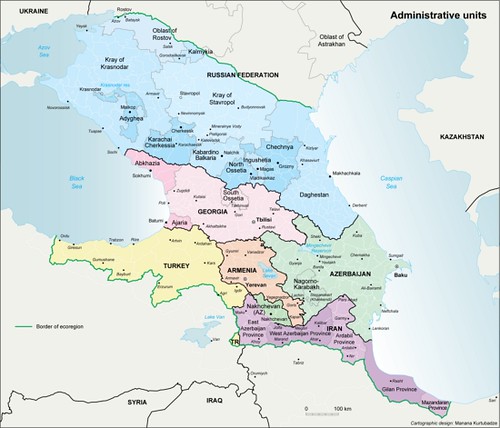The ancestral hatred between the Armenians and the Azeri Turks has been engraved by the pursuits of colonialism, authoritarianism, and religious differences. Ethnic disputes in the Caucasus are nothing new; home to vast array of communities such as the Georgians, Armenians, Persians, Kurds, Azeri Turks, Turks and Circassians.
Soviet Past
The fighting between Armenia and Azerbaijan, over the Nagorno-Karabakh region can trace back it’s root’s to when both countries were under the USSR. Under the authoritarian regime of Joseph Stalin, a majority of Armenian populated highlands over Azerbaijan were lumped together, despite the opposition of the overwhelming majority of its local population. Rather than resolving national conflicts, Soviet policies exacerbated distrust.
During the 1980s, ethnic Armenians who inhabited the Nagorno-Karabakh region saw an opportunity to reunite with Armenia, since ethnic nationalism was frowned upon in Soviet times. The result was a bloody war in the 1990s that killed 30,000 individuals. Unfortunately, Azerbaijan bore the greater cost with more deaths and refugees. By the time the war ended, Armenia had seized Nagorno-Karabakh and some surrounding areas.
Conflict Restarts
Despite the 1990s ceasefire, clashes have periodically broken out since then. In 2016, hundreds died in four days of fighting. On September 27, 2020, fighting resumed and approximately 700 Armenian soldiers were killed. Azerbaijan has not been disclosing its military death toll. But the government said that 14 civilians were killed in Ganja, Azerbaijan’s second-largest city, in an overnight missile attack by Armenia. In terms of artillery and weapons, Azerbaijan, an oil-gas hub west of the Caspian Sea, has deployed superior firepower, using drones and artillery systems used in Israel, Turkey and Russia.
However, in the week’s of fighting, Azerbaijan has failed to prove their military strength over Armenia, signaling that this may be a disastrous war on the loose. In his most recent address to the nation, Azerbaijan President Ilham Aliyev said: “We will continue to drive the invaders out of our land.” This could provoke Azerbaijan’s greatest ally, Turkey, against Russia, which has a mutual defense alliance with Armenia.
Foreign Relations
The U.S. policy on this crisis, according to Secretary of State, Mike Pompeo “[…] is that there has been a long-standing conflict between these two countries in this particular piece of real estate […] we’re discouraging internationalization of this, we think outsiders ought to stay out.” The problem is that this conflict has been internationalized since its start. It was arguably the international intervention in the Caucasus that helped create it.
Small regional conflicts without clear U.S. correspondence can grow into major international flare-ups after erupting for years without international engagement. Azerbaijan sits at a crossroads of geographies and ideologies, on top of a resource-rich area long eyed for its petrochemical reserves. A secular Shia Muslim-majority state, it is physically positioned as a wedge between Russia and Iran, two countries who present serious challenges to American leadership in the region and the world.


